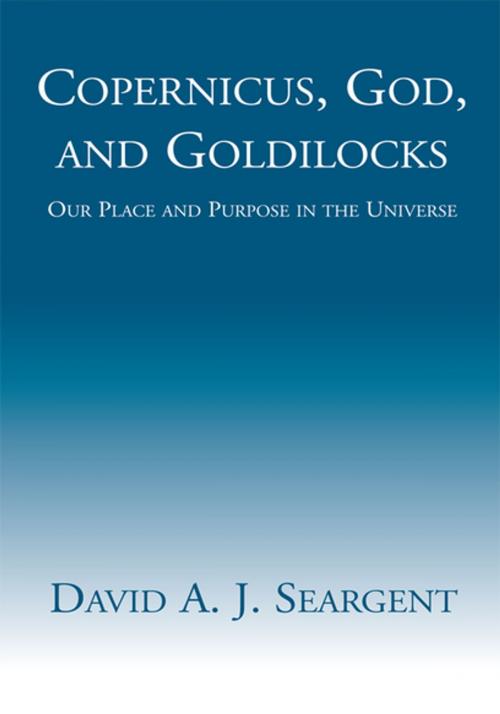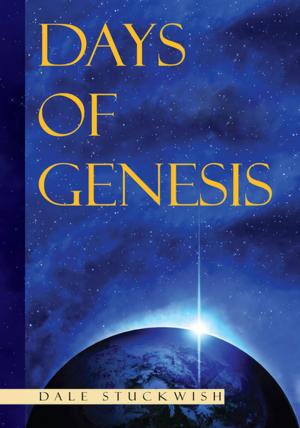Copernicus, God, and Goldilocks
Our Place and Purpose in the Universe
Nonfiction, Religion & Spirituality, Christianity, Education| Author: | David A. J. Seargent | ISBN: | 9781462804542 |
| Publisher: | Xlibris US | Publication: | October 9, 2001 |
| Imprint: | Xlibris US | Language: | English |
| Author: | David A. J. Seargent |
| ISBN: | 9781462804542 |
| Publisher: | Xlibris US |
| Publication: | October 9, 2001 |
| Imprint: | Xlibris US |
| Language: | English |
In this book, author David Seargent takes issue with the assumption, long held in Western thought, that mankind and the planet we inhabit, has no special or privileged features; that our being here is purely a matter of chance. Typically, the so-called Copernican Principle which, in essence, is simply an empirical statement about our physical non-centrality, is raised to the level of a fundamental principle of nature decreeing that there be no special significance in either our location or in anything else associated with our existence. The author argues that our non-centrality on the cosmic stage is not the result of such a basic principle of nature, but is actually the consequence of the fact that our very existence is dependent upon a finely-tuned convergence of many different factors; a convergence which cannot occur in the centres of either the Solar System or Galaxy. In short, our position away from the centre does not reflect a principle of nature decreeing that our place in the scheme of things be a lowly one. On the contrary, it is a simple consequence of the fact that central regions of solar systems and galaxies are not places where life with our degree of complexity can survive.
At a more fundamental level, it is argued that the Copernican Principle (in its formulation as a basic principle of nature) actually makes predictions which are in conflict with observational evidence. The most serious conflict concerns the nature of the Universe at large. If the Copernican Principle is truly fundamental, it must be capable of being generalized such that no place in either space or time is given any special significance. This so called Perfect Cosmological Principle - a logical consequence of the Copernican Principle - predicts an eternal and infinite Steady State universe in strong conflict with observational evidence.
The question as to whether the earths position is in any way significant or special is to be examined within an observational context, not by appeal to a supposed natural principle decreeing that our place necessarily be without special significance. The author presents evidence supporting the contention that the earths place in the cosmos is indeed special, not in the sense of being central, but in the sense of being a highly unusual safe zone where advanced life can live and thrive. The zone is rendered safe because of a highly improbable convergence of many factors relating to the nature of our planet itself, the unusual nature of the moon, the wider Solar System, the sun and its unusual position within the Galaxy and even the Galaxy and its position in relation to similar nearby systems. Advanced life on earth exists on a razors edge, but is maintained in this exquisitely delicate balance by a just right convergence of factors. The author terms this the Goldilocks Principle - the principle stating that for complex life to exist, conditions must be just right; must be confined to a very narrow zone and that this zone be maintained by a highly improbable convergence of a variety of factors.
Some of the more important of these factors are discussed, demonstrating just how finely balanced the conditions must be to allow life at our level of complexity to exist.
Such a delicate balance must of necessity appear to exhibit purposeful design. But is this appearance real?
It is argued that the appearance is, indeed, genuine.
The argument that if enough monkeys play with enough computer keyboards for a sufficient length of time something intelligible, i.e.something having the appearance of design, will emerge, is debunked. It is argued that if an apparent product of design actually fulfils the purpose for which it appears to have been designed, the only rational answer is to accept the design as real. Monkeys playing with keyboards may just possibly prod
In this book, author David Seargent takes issue with the assumption, long held in Western thought, that mankind and the planet we inhabit, has no special or privileged features; that our being here is purely a matter of chance. Typically, the so-called Copernican Principle which, in essence, is simply an empirical statement about our physical non-centrality, is raised to the level of a fundamental principle of nature decreeing that there be no special significance in either our location or in anything else associated with our existence. The author argues that our non-centrality on the cosmic stage is not the result of such a basic principle of nature, but is actually the consequence of the fact that our very existence is dependent upon a finely-tuned convergence of many different factors; a convergence which cannot occur in the centres of either the Solar System or Galaxy. In short, our position away from the centre does not reflect a principle of nature decreeing that our place in the scheme of things be a lowly one. On the contrary, it is a simple consequence of the fact that central regions of solar systems and galaxies are not places where life with our degree of complexity can survive.
At a more fundamental level, it is argued that the Copernican Principle (in its formulation as a basic principle of nature) actually makes predictions which are in conflict with observational evidence. The most serious conflict concerns the nature of the Universe at large. If the Copernican Principle is truly fundamental, it must be capable of being generalized such that no place in either space or time is given any special significance. This so called Perfect Cosmological Principle - a logical consequence of the Copernican Principle - predicts an eternal and infinite Steady State universe in strong conflict with observational evidence.
The question as to whether the earths position is in any way significant or special is to be examined within an observational context, not by appeal to a supposed natural principle decreeing that our place necessarily be without special significance. The author presents evidence supporting the contention that the earths place in the cosmos is indeed special, not in the sense of being central, but in the sense of being a highly unusual safe zone where advanced life can live and thrive. The zone is rendered safe because of a highly improbable convergence of many factors relating to the nature of our planet itself, the unusual nature of the moon, the wider Solar System, the sun and its unusual position within the Galaxy and even the Galaxy and its position in relation to similar nearby systems. Advanced life on earth exists on a razors edge, but is maintained in this exquisitely delicate balance by a just right convergence of factors. The author terms this the Goldilocks Principle - the principle stating that for complex life to exist, conditions must be just right; must be confined to a very narrow zone and that this zone be maintained by a highly improbable convergence of a variety of factors.
Some of the more important of these factors are discussed, demonstrating just how finely balanced the conditions must be to allow life at our level of complexity to exist.
Such a delicate balance must of necessity appear to exhibit purposeful design. But is this appearance real?
It is argued that the appearance is, indeed, genuine.
The argument that if enough monkeys play with enough computer keyboards for a sufficient length of time something intelligible, i.e.something having the appearance of design, will emerge, is debunked. It is argued that if an apparent product of design actually fulfils the purpose for which it appears to have been designed, the only rational answer is to accept the design as real. Monkeys playing with keyboards may just possibly prod















